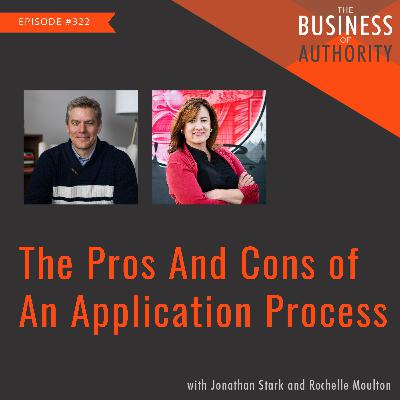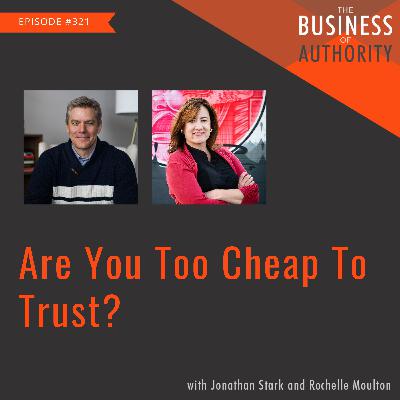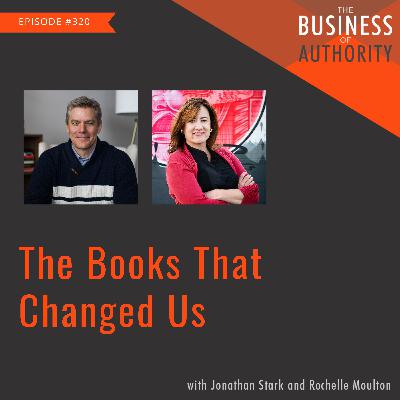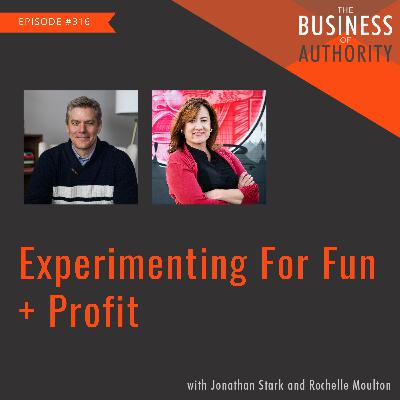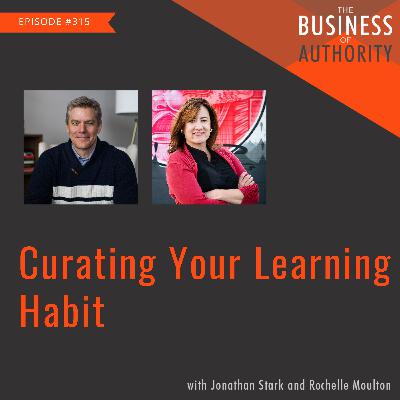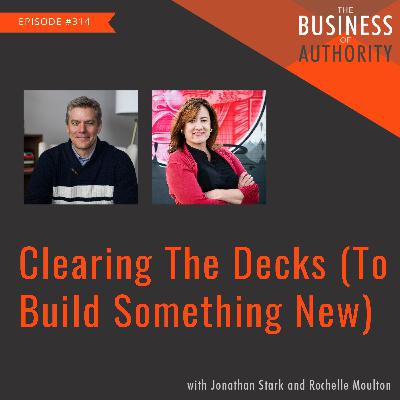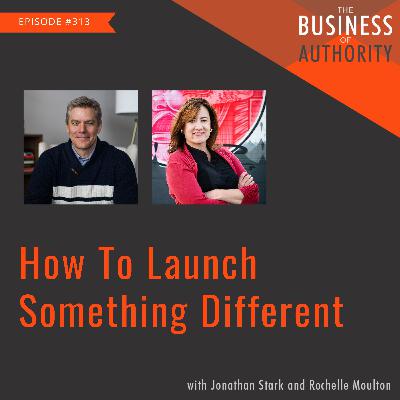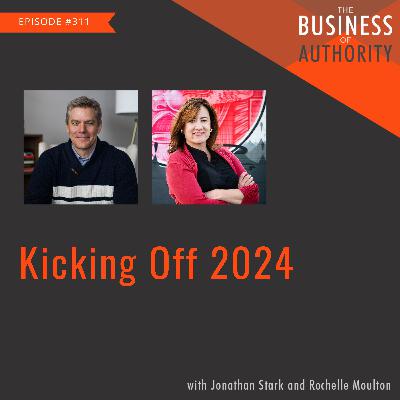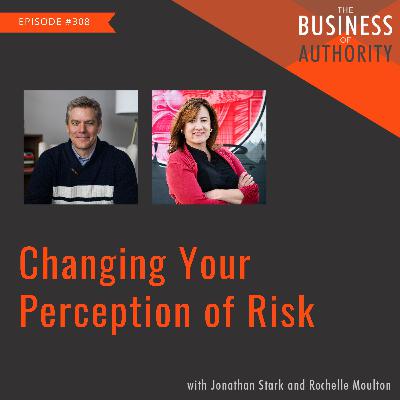Discover The Business of Authority
The Business of Authority

The Business of Authority
Author: Jonathan Stark and Rochelle Moulton
Subscribed: 249Played: 9,485Subscribe
Share
© The Business of Authority
Description
How to make a living while you’re making a difference.
A weekly show for independent professionals who want to go from six-figures to seven while increasing their impact on the world.
A weekly show for independent professionals who want to go from six-figures to seven while increasing their impact on the world.
327 Episodes
Reverse
We talk about where we’re taking the show and how your feedback will impact our next steps.It's your chance to reach out (see the links below) and weigh in!
LINKSRochelle | Email List | LinkedIn | Twitter | InstagramJonathan | Daily List | Website | Ditcherville | LinkedIn | Twitter
Do you know how to position your product or service?Talking PointsApril’s backgroundWhy positioning is importantWhat positioning isEmail for lawyersProblems caused by weak positioningHow solos can identify positioning problemsChoosing criteria that ensures clients will be happy in the endPositioning the business itself versus individual offeringsHow publishing a book affected April’s inbound leadsBooks as part of the overall businessQuotable Quotes“There’s branding and there’s positioning. Those two things are totally separate, and in fact, you need to have your positioning sorted out first, before you decide what your branding should be.” –AD“Now I think there’s more of an awareness around positioning.” –AD“Now, I’m booked up 3-4 months in advance, my rates are way higher, I work way less, and my clients are way happier, because I only promise to do this one very narrow thing, but it’s a super valuable thing, and if you’ve got this problem, who else you gonna call?” –AD“If you’re going to make that investment in doing marketing, there should be a call to action in there.” --AD
LINKSRochelle | Email List | LinkedIn | Twitter | InstagramJonathan | Daily List | Website | Ditcherville | LinkedIn | Twitter
Why passion alone isn’t enough—we also need rigor and hard work to build a successful Passion Economy business.Rethinking your client base as a very tight, intimate group, because fewer passionate clients beat a lot of indifferent ones.How to get clear on the unique value you bring to your clients—and weave that into your business model (and marketing).When letting go of non-ideal clients is essential and how it changes the dynamics of your work.Why pricing should be a dialogue between you and your client vs. a static thing (and why a “shocking” price may be exactly what you need).Quotables“What do you want to be worried about at 3 in the morning—cause you’re gonna be worried at 3 in the morning if you’re an entrepreneur.”—AD“The passion word should convey: I’m going to put me and the wholeness of me into how I make a living. It’s a strong choice. It’s not a trivial choice.”—AD“The rest of us have to use the tools of scale, use the tools of digital communication…to find our intimate group, to find our tiny village even if they’re thinly spread all over the world.”—AD“You don’t want to be the same. You want to say I do this one thing and I do it really well and 99% of people have zero use for it, but there are people who will love it.”—AD“You want to become THE brand for your micro niche.”—AD“1/3 of your customers…are costing you money...if you actually add up the time and how much you’re making, you’d be way better off doing new customer development—or just sleeping.”—AD“It’s the stuff you’re thinking about when you’re doing the pitch that is often the most valuable. You’re looking at this company, you’re sizing them up, you’re taking in what they’re asking and then you’re really coming up with a big strategic vision…the value you’re adding is often front-loaded in that pitch.”—AD“Price really should reflect a dialogue between you and your customer. That customer is getting unique value from you. What is THAT value?”—AD“What if I doubled my prices tomorrow—what would happen? That probably for most people will provoke a crisis.”—ADLINKSThe Passion EconomyTwitter
LINKSRochelle | Email List | LinkedIn | Twitter | InstagramJonathan | Daily List | Website | Ditcherville | LinkedIn | Twitter
How niching down—think of it as repetition—gives you the opportunity for focused practice.Why we refer to consulting and coaching as practices.Giving yourself permission to suck—while you gradually improve.How to reframe repetition (think continual upward spiral) as practice.
LINKSRochelle | Email List | LinkedIn | Twitter | InstagramJonathan | Daily List | Website | Ditcherville | LinkedIn | Twitter
Why it’s tempting to conflate productivity with working in your genius zone (and how to think about it instead).Finding joy in “brain dead” activities (or anything necessary, but not strictly in your genius zone).The difference between light lift and deep dive genius zone activities.How to handle resistance to entering your genius zone.Why you don’t have to work solo inside your genius zone (aka the magic of co-creating).----And of course, big thanks to Louis Grenier for inspiring this episode. If you hate marketing BS as much as we do, you are going to love his podcast: Everyone Hates Marketers
LINKSRochelle | Email List | LinkedIn | Twitter | InstagramJonathan | Daily List | Website | Ditcherville | LinkedIn | Twitter
When you want to use an application process to screen potential clients and group members.The particular challenges applications present (and a few work-arounds).Why conversion rates are much higher when using applications to “gate” your service.How to use an application process to enhance the experience of your ideal clients and buyers.
LINKSRochelle | Email List | LinkedIn | Twitter | InstagramJonathan | Daily List | Website | Ditcherville | LinkedIn | Twitter
How to use pricing as a tool to niche down your audience.Why engaging clients BEFORE they have the big problem you solve seldom works.Becoming aware of the stories you tell yourself about money—and how they impact your pricing and packaging.Why it’s not unethical to charge top dollar for your services (and one solution if you balk at increasing your profit).The fairness fallacy: why “fair” is an impossible way to set your prices.
LINKSRochelle | Email List | LinkedIn | Twitter | InstagramJonathan | Daily List | Website | Ditcherville | LinkedIn | Twitter
How the books you read as a child can help chart the course of your life.The business and leadership books we found at EXACTLY the right time for each of us.Why the right biographies, self-help and inspirational books (and other non-conventional business books) can lead to business break-throughs.How the personal nature of what we get from books can change depending on when we read them.LINKSThe Servant LeaderManaging The Professional Service FirmThe Trusted Advisor Desert Queen The Big LeapThe Simple Path to Wealth Value-Based FeesHow To Measure AnythingBook Yourself SolidGetting Things DoneThe E-Myth RevisitedThe Secret of Selling AnythingThinking In BetsGodel Escher Bach: An Eternal Golden Braid
LINKSRochelle | Email List | LinkedIn | Twitter | InstagramJonathan | Daily List | Website | Ditcherville | LinkedIn | Twitter
Why this is not “slimy selling,” but genuinely providing value to the people you want to serve.The role of business development in “whale” B2B models (and how it fuels high-end consulting practices).Using LinkedIn to discover your ideal people and leverage your interactions.A handful of examples using in-person conferences as part of your business development plan.The importance of prioritizing relationships and tracking your business development activity over time.
LINKSRochelle | Email List | LinkedIn | Twitter | InstagramJonathan | Daily List | Website | Ditcherville | LinkedIn | Twitter
Getting past the fear of an empty calendar following an intensive project. Hint: having a marketing system you work even when you’re slammed goes a long way.How to turn a wrap-up meeting into additional work, testimonials and/or referrals (and one specific problem this meeting will solve for you).The magic of taking time for yourself to recharge after an intense bout of work—and a few ideas to try out.The post project questions to ask yourself to narrow down your superpower(s) and focus them on even higher-value future work.How small rituals to close out projects can have big emotional and financial payoffs.
LINKSRochelle | Email List | LinkedIn | Twitter | InstagramJonathan | Daily List | Website | Ditcherville | LinkedIn | Twitter
NOTE: Rochelle and I (Jonathan) couldn't record last week. Rather than give you nothing (or a TBOA repeat) to listen to, I decided to dig through the Ditching Hourly archives and find an episode that long time fans of TBOA would be sure to enjoy. Here's the info from the Ditching Hourly site:The “Expertise Expert” himself, David C. Baker, joined me on Ditching Hourly to talk about the five things that happen right after you specialize.SummaryHere is an AI summary of the key points from the episode:The episode is a discussion between Jonathan Stark and David C. Baker about positioning and specialization for consultants and professional services firms.They discuss the importance of niche positioning to stand out, attract ideal clients, see client patterns more clearly, accelerate learning, and always have things to write and talk about.They outline 5 things that happen after narrowing your business focus:You don't instantly become smarter, but your rate of learning accelerates because you start seeing more examples of your niche.Impostor syndrome kicks in because you're making expertise-based claims you didn't make before, but this fear is often unfounded because you were willing to work with those clients previously.You don't have to turn down unrelated work right away during the transition period, though over time, you'll likely feel unsatisfied with off-target projects.You immediately start narrowing your focus even further, fine-tuning your positioning through real-world conversations and testing.Counterintuitively, you'll have way more to write and talk about when focused on a niche than as a generalist.Jonathan and David emphasize that niche positioning is critical before you can effectively differentiate, charge value-based pricing, market yourself, or even decide what content to produce. It brings focus to everything that follows.About David C. Baker“The Leading Authority on Positioning, Reinventing, and Selling Firms in the Creative and Digital Space.”David C. Baker is the author of five books, three of which focus on the central elements of the business of expertise: positioning, financial management, and leadership. David speaks regularly on more than 70 topics relevant to entrepreneurial expertise, from 20 executives to 5,000 live on TV worldwide, and has worked with 900+ firms through his Total Business Review process.David's LinksDavid's WebsiteDavid's book: The Business of ExpertiseDavid's podcast (with Blair Enns)David's article on Specialization
LINKSRochelle | Email List | LinkedIn | Twitter | InstagramJonathan | Daily List | Website | Ditcherville | LinkedIn | Twitter
When to shake things up by trying an experiment in your business.Why it’s worth challenging your own perceptions and/or the norms of a popular platform.Creating your own “book central” to capture everything you need to help with marketing and sales of your product in one place.One surprising outcome of this experiment (and why it will keep leveraging itself indefinitely).How starting with a niche book can expand your audience well beyond your intended target.
LINKSRochelle | Email List | LinkedIn | Twitter | InstagramJonathan | Daily List | Website | Ditcherville | LinkedIn | Twitter
When to consider learning from a 1-1 coach vs. a group experience—and how to think about when an investment makes sense.Building your own network of peers—through community participation or seeking out 1-1 relationships.Why guided experimentation works for so many soloists in the expertise space (and how to find those experiences).How to match your learning investments (time and money) with your business stage.Learning from your marketplace, including having regular conversations with your potential clients and buyers.
LINKSRochelle | Email List | LinkedIn | Twitter | InstagramJonathan | Daily List | Website | Ditcherville | LinkedIn | Twitter
Why you want to move those “bees in your head” to a Projects List where they don’t interfere with your focus right now.The importance of testing your concept (with yourself) and perhaps others before investing significant build time.Ways to organize the design flow of a time-bound challenge—and why cohorts can be so magical.Using technology short-cuts (like Zapier and ConvertKit)—and the value of testing your automations before you go live.Why documenting the process as you go is an easy move that pays off big if you decide to launch the program again.
LINKSRochelle | Email List | LinkedIn | Twitter | InstagramJonathan | Daily List | Website | Ditcherville | LinkedIn | Twitter
How to identify your target market and create just enough of a description of the new offering to test it with them.Different ways to construct a “listening tour” for feedback and constructive criticism depending on your idea and your goal.Why you want to prepare a throughline—the compelling story that connects what you’ve been doing to your new thing.The value in embracing imperfection and adopting an experimental mindset.
LINKSRochelle | Email List | LinkedIn | Twitter | InstagramJonathan | Daily List | Website | Ditcherville | LinkedIn | Twitter
Which is best: using your name or creating a company name for your expertise business (hint: what’s your end game)?How to deal with an unusual, unpronounceable (to your audience) or too-common name.Why your company name matters less than you think (but your URL is gold).Naming your books, products and services and why that’s different than naming your firm.The non-intuitive question to ask yourself when naming each of your babies.
LINKSRochelle | Email List | LinkedIn | Twitter | InstagramJonathan | Daily List | Website | Ditcherville | LinkedIn | Twitter
Why you can’t let what’s going on in the world keep you from playing your game, serving your niche.How to decide your themes for the year (and a sneak peek into ours).The role of energy in deciding how you want to spend this moment/this day/this month/this year.Why how you feel about your to-do list is a leading indicator of what you’ll actually accomplish (spoiler alert: delete/offload the low energy stuff).How to identify small changes to remove draining tasks and add energizing ones—AKA genius zone work—to your schedule.LINKSJonathan | Daily List | Website | Ditcherville | LinkedIn | TwitterRochelle | Email List | Soloist Women | LinkedIn | Twitter | Instagram
LINKSRochelle | Email List | LinkedIn | Twitter | InstagramJonathan | Daily List | Website | Ditcherville | LinkedIn | Twitter
Why we tend to think “balance” is a single point where we remain forever (even though that’s not how life usually works).The role boundaries play in how happy you feel with your choices.How your genius zone factors into structuring your work and your life.Choosing to keep your work and your life in an upward spiral—and why that sometimes means letting go of your past self.LINKSRochelle | Email List | Soloist Women | LinkedIn | Twitter | InstagramJonathan | Daily List | Website | Ditcherville | LinkedIn | Twitter
LINKSRochelle | Email List | LinkedIn | Twitter | InstagramJonathan | Daily List | Website | Ditcherville | LinkedIn | Twitter
How to blend both analytical and feelings-based reviews into your planning (and the key questions to ask yourself before making any final decisions).Translating your bets into systems to lock-and-load your goals into your recurring (daily, weekly, monthly) actions.How adding a paper—yes paper!—calendar to your planning routine might pay off for you.Why you want to choose a theme for the year—and how to think about yours.The most important factor to consider when evaluating multiple bets.
LINKSRochelle | Email List | LinkedIn | Twitter | InstagramJonathan | Daily List | Website | Ditcherville | LinkedIn | Twitter
How to know if your next move is all that risky—or just feels risky?Why it’s worth doing an analytical assessment of a specific risk before just saying no (or yes).How to reduce the uncertainty in any action(s) you’re considering.When your fear is more about the qualitative experience than about how you’ll look/how much money is at stake.LINKSRochelle | Email List | Soloist Women | LinkedIn | Twitter | InstagramJonathan | Daily List | Website | Ditcherville | LinkedIn | Twitter
LINKSRochelle | Email List | LinkedIn | Twitter | InstagramJonathan | Daily List | Website | Ditcherville | LinkedIn | Twitter







